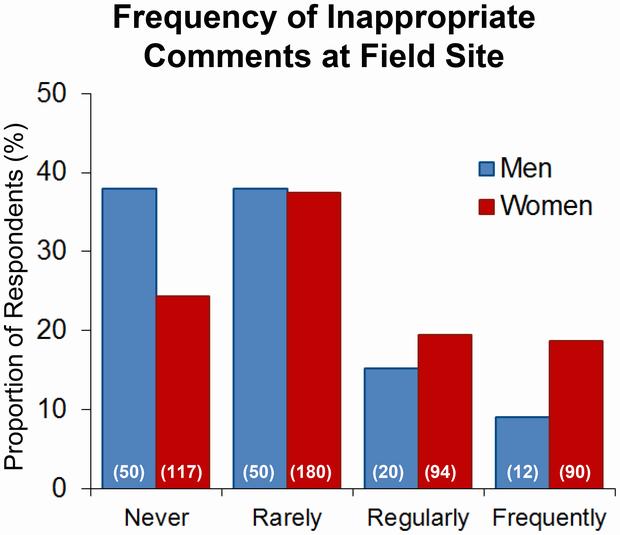A new survey analysis finds that in just about about any field where there are academics and field work, there is going to be sexual harassment and even assault.
Yes, surveys, the bane of the scientific method. The authors analyzed survey results of 666 people (142 men, 516 women) with field experience in anthropology, archeology and more, and found that many respondents claimed to have suffered or witnessed sexual harassment or even sexual assault while at work in the field.
A majority of the survey respondents (64 percent) said they had experienced sexual harassment (inappropriate sexual remarks, comments about physical beauty, jokes about cognitive sex differences, obviously "inappropriate comments" criteria are subjective) while over 20 percent reported they had been the victims of unwanted physical contact of a sexual nature, including touching, physical threats, or rape. Those are not subjective at all.

Proportion of survey respondents, by gender, who indicated that inappropriate or sexual comments occurred never, rarely, regularly, or frequently at their most recent or most notable field site (N).doi:10.1371/journal.pone.0102172
Obviously rape is a criminal act so the first place to look for confirmation would be police records rather than survey claims by people recruited through the Internet. The authors say that isn't possible because few respondents, presumably intelligent people in a scientific area, "were aware of mechanisms to report incidents", which defies belief to women in the private sector, who could tell these academics exactly how they could have notified the police.
"Our main findings – that women trainees were disproportionately targeted for abuse and felt they had few avenues to report or resolve these problems – suggest that at least some field sites are not safe, nor inclusive," said lead author Kathryn Clancy, anthropologist at the University of Illinois at Urbana-Champaign. "We worry this is at least one mechanism driving women from science."
Or not. The social sciences are overwhelmingly women and archeology is 49 percent women while 60 percent of Ph.D.s in anthropology are women.
The methodology is a concern, though you can stop reading if awkward questions about the viability of the results make you uncomfortable. They recruited respondents through social media outlets and websites who filled out an online survey asking them about their educational and professional status, gender, age, and experiences during field studies. The data is not available, yet somehow PLOS accepted it even after their much-publicized open data policy from earlier this year.
Female researchers reported most often that they were the targets of researchers who were superior to them in rank – either more-established scientists working on the same sites, or leaders of the research - while males were most often harassed or abused by their peers.
Since field research is a required component for a degree in many disciplines, sexual harassment in academic culture is obviously a concern, but no one is going to take action based on secret data drawn from surveys with no controls of any kind. It will get plenty of mainstream attention and some committees formed to talk about it, but little can be done without people willing to produce data.
Still, even if there is no valid data, we know this can be a problem that should be proactively addressed. The authors note that field work is often one of the most exciting parts of science and a negative experience will drive people from academia. And they note that if there are problems, expedition leaders who are used to navigating university politics and grant committees may be uncomfortable tackling interpersonal conflicts in remote locations.
Some sort of field guidelines should be produced. What is startling is that fields like anthropology haven't done it long before now.
The pitfalls are obvious. As Clancy notes, "If you are on constant high alert because you have been harassed or you are at a site where you know it happens regularly, it drains your cognitive reserves and makes you less effective at your job. No one can work well under those conditions, and we can't ask trainees to keep doing so."






Comments